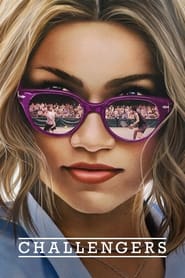Much has been made of the heavy-handed symbolism of Patrick and Art eating churros together. But if those sweet Spanish snacks are meant to be phallic (along with the even more unsubtle banana and the dramatic unsheathing of a tennis racket from its plastic prison), what on earth could the film be saying when one of them chomps on a boiled egg after losing an argument with Tashi?
Ultimately, though, there's an emptiness to this admittedly low-stakes movie that's hard to pin down. I don't quite agree with Richard Brody that the film's structure is confusing and/or its the chief source of the film's problems. It's certainly true that its time schemes aren't very rewarding for the viewer to unpack. Whatever you think of Christopher Nolan's nonlinear narrative structures, you are forced to concede that the viewer gains some narrative reward through parsing his films' structures and, as a result, is likely to invest the effort required to subconsciously resolve their divergent fabula and syuzhet. But that is not quite the case with Challengers, as there were no remotely bombshell revelations inherent in the progressive reveal of the detail beyond, say, that Art and Patrick knew each other when growing up. As a result, I eventually started to become weary when "X years previously" appeared on screen. It's true that it revealed more about what led them to where they are, but it didn't subvert any assumptions that I had made in the minutes prior.
What is the film missing, then? Perhaps it could have done more with the protagonist's divergent class backgrounds. Or how Tashi's biracial plays out in relation to her moneyed background on the presumably rather white tennis circuit — which wins out: her race, her money or her tennis? Or more paratextual comment on Celine Song's Past Lives as kind of cinematic poison pen? Or more engagement with the homosocial and (potentially) homoerotic culture of tennis? Or, I don't know, more about how Art deliberately entering a contest where he has a much better chance of winning is both potentially emasculating for him, but also has parallels with Patrick swiping right endlessly on Tinder in order to, so to speak, score?
Or perhaps just more sex? Indeed, after a number of years with films where everyone is beautiful but no-one is horny, does Challengers suggest that mainstream movies can be hot again? RS Benedict's thesis was, admittedly, always predicated on restricting its gaze to the influential multiplex: nobody could have seen Portrait of a Lady on Fire (2019), Passages (2023) or even Crimes of the Future (2022) without raising an eyebrow at that blanket assertion. Still, there is something fun about seeing this on the big screen—and seeing it on the big screen with strangers in the room as well—that I haven't felt in a while.
ps. Somewhat crazy that this film was written by the same guy who made the 2011 viral video, "Potion Seller".
Challengers gives its characters virtually no identity, no existence other than what they do onscreen. They have no interests, no inclinations, and, oddly for a movie that depends so significantly on sexual relations, little physicality. Only the three lead actors’ vibrant personalities and energetic performances lend the characters an illusion of substance.
— Richard Brody (The New Yorker)
[Lttered] with product placement, and for every Uniqlo jersey, Applebees cigarette, Taco Bell bag, Chanel-monogrammed slipper, or Coca-Cola there is an equal measure of flashy camerawork, blaring musical cues, and shots so quick it’s as if you never saw them. The film doesn’t need sex scenes because every formal element is there to maximise our pleasure. It’s sensory overload.
— Maia Wyman (Dazed Digital)
Synopsis: Tennis player turned coach Tashi has taken her husband, Art, and transformed him into a world-famous Major champion. To jolt him out of his recent losing streak, she signs him up for a "Challenger" event — close to the lowest level of pro tournament — where he finds himself standing across the net from his former best friend and Tashi's former boyfriend.

